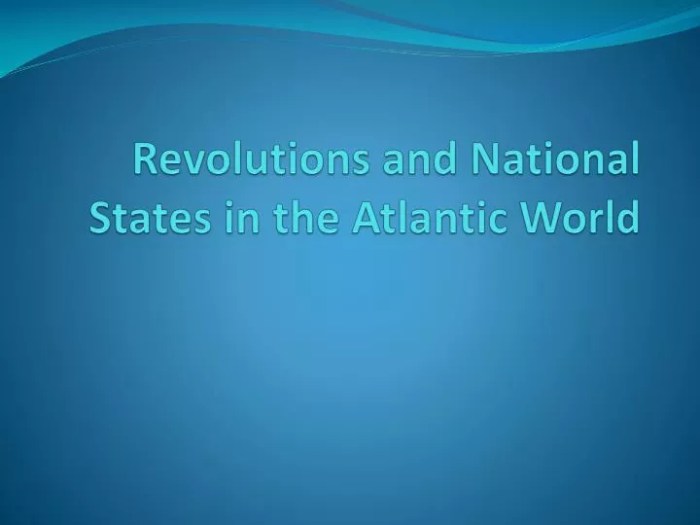Chapter 28 revolutions and national states in the atlantic world – Chapter 28: Revolutions and National States in the Atlantic World delves into the transformative events that reshaped the political and social landscapes of the Americas, Europe, and Africa. This chapter explores the causes, consequences, and legacies of revolutions that ignited the birth of new nations and the challenges and opportunities they faced.
From the American Revolution’s fight for independence to the Haitian Revolution’s struggle for freedom and equality, this chapter analyzes the similarities and differences between these pivotal uprisings. It also examines the concept of nation-states and the process of their formation in the Americas, highlighting the unique experiences of newly independent nations.
Revolutions in the Atlantic World

The Atlantic world was a hotbed of revolutions in the late 18th and early 19th centuries. The American Revolution (1775-1783) and the Haitian Revolution (1791-1804) were two of the most significant of these revolutions. Both revolutions were sparked by Enlightenment ideas about liberty and equality, but they had different causes, consequences, and legacies.
Causes of the American Revolution
The American Revolution was caused by a number of factors, including:
- British economic policies that favored British merchants over American colonists
- The presence of a large and growing population of American colonists who were increasingly resentful of British rule
- The spread of Enlightenment ideas about liberty and equality
Consequences of the American Revolution
The American Revolution had a number of consequences, including:
- The creation of the United States of America
- The spread of Enlightenment ideas throughout the world
- The weakening of the British Empire
Causes of the Haitian Revolution
The Haitian Revolution was caused by a number of factors, including:
- The harsh conditions of slavery on the French colony of Saint-Domingue
- The spread of Enlightenment ideas about liberty and equality
- The presence of a large and growing population of enslaved Africans who were increasingly resentful of their condition
Consequences of the Haitian Revolution, Chapter 28 revolutions and national states in the atlantic world
The Haitian Revolution had a number of consequences, including:
- The creation of the independent nation of Haiti
- The spread of Enlightenment ideas throughout the world
- The weakening of the French Empire
- The abolition of slavery in the French colonies
Similarities and Differences between the American and Haitian Revolutions
The American and Haitian Revolutions were both sparked by Enlightenment ideas about liberty and equality. However, there were also a number of differences between the two revolutions. The American Revolution was fought primarily by white colonists, while the Haitian Revolution was fought by enslaved Africans.
The American Revolution was successful in creating an independent nation, while the Haitian Revolution was only partially successful. The Haitian Revolution did not lead to the abolition of slavery in the United States, but it did lead to the abolition of slavery in the French colonies.
National States in the Atlantic World

The American and Haitian Revolutions were part of a larger trend towards the formation of nation-states in the Atlantic world. A nation-state is a political entity that is defined by a shared sense of identity, culture, and history. The process of nation-state formation in the Americas was complex and uneven.
In some cases, nation-states were created through the process of revolution, while in other cases they were created through the process of gradual evolution.
Challenges and Opportunities Faced by Newly Independent Nations in the Atlantic World
Newly independent nations in the Atlantic world faced a number of challenges, including:
- Economic instability
- Political instability
- Social inequality
- Threats from foreign powers
However, newly independent nations in the Atlantic world also faced a number of opportunities, including:
- The opportunity to create new political and economic systems
- The opportunity to build new national identities
- The opportunity to play a role in global affairs
The Atlantic World as a Connected Region

The Atlantic Ocean was a major force in shaping the Atlantic world. The ocean connected the Americas, Europe, and Africa, and it facilitated the flow of trade, migration, and cultural exchange. The Atlantic world was a dynamic and interconnected region, and it played a major role in global history.
Role of Trade, Migration, and Cultural Exchange in Shaping the Atlantic World
Trade, migration, and cultural exchange played a major role in shaping the Atlantic world. Trade brought new goods and ideas to the Americas, Europe, and Africa. Migration led to the mixing of different cultures and the creation of new societies.
Cultural exchange led to the spread of new ideas and values. The Atlantic world was a melting pot of different cultures, and it was a place where new ideas and values were constantly being created.
Impact of the Atlantic World on Global History
The Atlantic world had a major impact on global history. The Atlantic world was the birthplace of the Industrial Revolution, and it was the center of global trade and commerce. The Atlantic world was also the source of new ideas and values that spread throughout the world.
The Atlantic world was a major force in shaping the modern world, and it continues to be a major force in global affairs today.
Query Resolution: Chapter 28 Revolutions And National States In The Atlantic World
What were the primary causes of the American Revolution?
The American Revolution was sparked by a complex interplay of factors, including British economic policies, political grievances, and the desire for self-governance.
How did the Haitian Revolution differ from the American Revolution?
While both revolutions sought independence, the Haitian Revolution was unique in its focus on the abolition of slavery and the establishment of a multiracial society.
What challenges did newly independent nations in the Atlantic world face?
Newly independent nations faced numerous challenges, such as economic instability, political instability, and external threats from European powers.